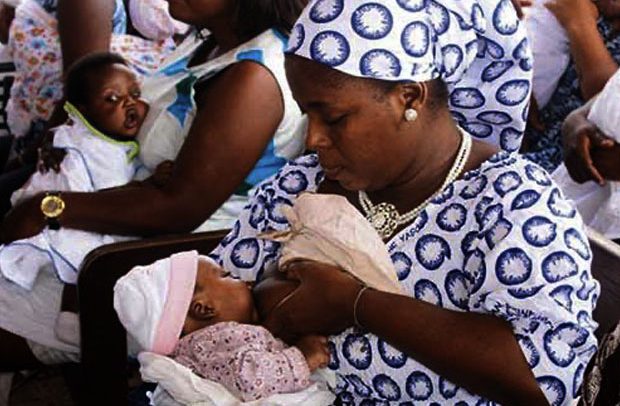A mother breastfeeding her baby
The Covid-19 pandemic has affected several ongoing health programmes and disrupted interventions aimed at improving long-term health outcomes.
It has also caused significant disruptions in routine immunization against vaccine preventable diseases and breastfeeding support services while increasing the risk of food insecurity and malnutrition.
Director-General, Ghana Health Service, (GHS) Dr Patrick Kuma-Aboagye, said although there has been a decline in exclusive breastfeeding in the last decade, the Covid-19 pandemic had aggravated the situation which is already threatened by producers of baby foods.
He noted that the situation has been compounded by baby food companies invoking unfounded rumours that breastfeeding could transmit Covid-19 from the mother to the child and thus marketing their products as a safer alternative to breastfeeding.
As a result, the country is recording a significant drop in its exclusive breastfeeding rate from 63 per cent in 2008, to the current prevalence of 43 percent.
Breastfeeding Week
The GHS and the Child Health Division (CHD) has launched the 2021 national breastfeeding week on the theme, “Protect Breastfeeding: A Shared responsibility” to revisit actions and country commitments by prioritising breastfeeding-friendly environments for mothers and their babies.
Actions to be undertaken within the week are aimed at sustaining ongoing capacity building to provide healthcare workers the needed resources and information, to effectively support mothers to exclusively breastfeed for six months. It includes ensuring the full implementation of the International Code of Marketing of Breastmilk Substitutes by governments, health workers, and industry, to protect mothers from aggressive marketing practices by the baby food industry.
The campaign also encourages employees to allow their female staff the time and space needed to practice exclusive breastfeeding, including paid parental leave with longer maternity leave, providing safe places for breastfeeding in the workplace, access to affordable and good-quality childcare, universal child benefits, and adequate wages.
Benefits of Exclusive Breastfeeding
Dr. Kuma-Aboagye said “close contact and early, exclusive breastfeeding helps a baby to thrive, women should be supported to breastfeed safely, hold her new born skin-to-skin, and share a room with her baby,” saying it was vital to ensure that breastfeeding mothers do not get targeted by industry or marketing professionals who wanted to jeopardise their natural ability for breastfeeding by promoting formula-feeding.
The Director-General said breastfeeding acts as babies’ first vaccine, protecting them against many common childhood illnesses, therefore breastfeeding remained central to the survival, health, and wellbeing of women, children, and nations.
Additionally, optimal breastfeeding, which entailed initiation of breastfeeding within the first hour of birth, followed by exclusive breastfeeding for six months and continuing for up to two years and beyond, offers a powerful line of defence against all forms of child malnutrition, including wasting and obesity, he explained.
Dr Kuma-Aboagye said the GHS and the Ministry of Health is working in close collaboration with key health partners including UNICEF and WHO, to commemorate the week’s campaign focusing on information sharing on the importance of breastfeeding, anchoring support as a vital public health responsibility, and engaging with individuals and organisations for greater impact.
He said the national goal is to work collectively to safeguard the health of women and children by ensuring that every child’s right to nutritious, safe, and affordable food and adequate nutrition is realised from the beginning of life, starting with breastfeeding.
“Expectant and nursing mothers require special protection to prevent harm to their infants’ health, and they need adequate time to give birth, to recover, and to nurse their children,” and at the same time, they also required protection to ensure that their jobs were not jeopardised because of pregnancy or maternity leave, he said.
By Jamila Akweley Okertchiri


